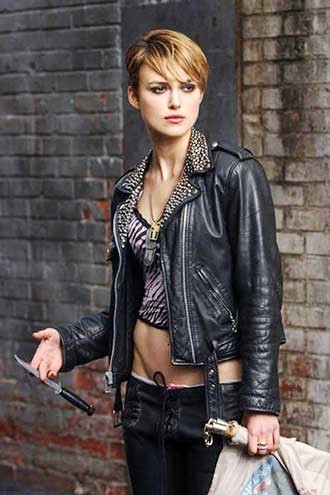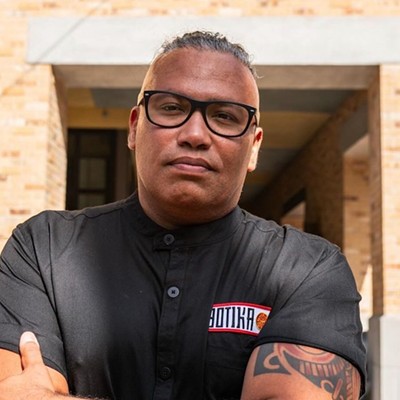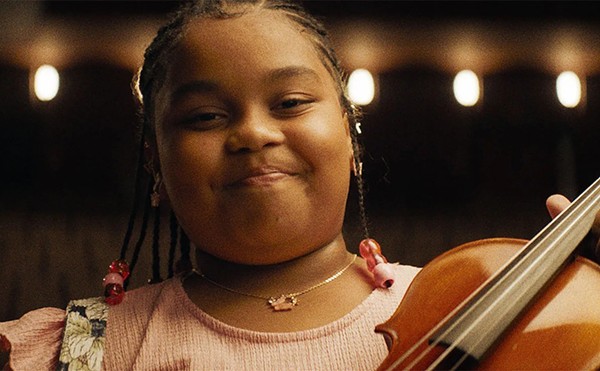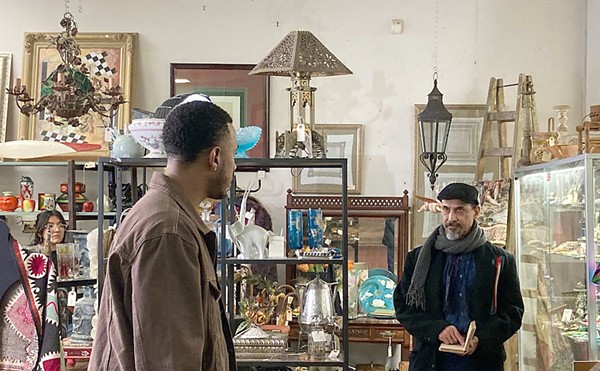Tony Scott's take on Domino Harvey is more fiction than fact, but so was the lady herself
Daughter of a movie star and a Vogue cover girl. A Ford model. A bounty hunter. Domino Harvey's life was the stuff of great fiction, mostly because that's exactly what it was. As the movie version of her declares in the new film loosely inspired by her life, "If you want to know what's true, you can fuck off 'cause I'll never tell you what it all meant."
The premise of director Tony Scott's shoot-em-up Domino starring Keira Knightley begins at least on solid ground, much like the real Harvey's myth. She was, without a doubt, born to supermodel Paulene Stone and British actor Laurence Harvey (The Manchurian Candidate) and she was, at least for a brief moment in her life, a "bail recovery agent" - or if you prefer the sexier moniker, a bounty hunter. Everything else you'll see is total bullshit, punctuated by gunfire, explosions, and pretty much exactly what you see in almost every one of Scott's films. Yep, that means there's a cluster-fuck shoot-out at the end, too. Whoopee.
| Keira Knightley stars as legendary bounty hunter Domino Harvey, who began life the privileged daughter of a supermodel and a famous actor and ended it in a bathtub, dead from an overdose. |
Here's a bit of what the filmmakers left out of Domino: Harvey was named after Bond girl Domino Derval from Thunderball. Her father died four years after she was born, from stomach cancer. He left Harvey a considerable estate that ensured she'd be financially secure for the rest of her life, but, like so many privileged youth, Harvey rebelled and by her teens had been booted out of four elite boarding schools. Allegedly, a brief career as a Ford model followed. "I was so unhappy, trying to be someone I wasn't," she said in one of her rare interviews. "When I was modeling they were trying to manipulate me. I remember thinking one night that my life was meaningless."
Around 1989, Harvey fled to America and the Hollywood Hills where her mother then lived, but a drug problem quickly landed her in rehab. After a series of oddly disparate jobs, such as running a nightclub, laboring as a ranch hand in the mountains around San Diego, and working as a firefighter on the Mexican border (coworkers called her "Dagger Bailey's" because of her favorite liquor and the 10-inch hunting knife she always wore), she decided to become a bounty hunter when she read an ad for a $300, two-week class for bail enforcement agents. Ed Martinez, a Vietnam vet and former gang member, became her mentor. Together, they captured some 50 fugitives. She carried a shotgun called Betsy and a 9mm Browning pistol.
By 1995, Martinez abandoned L.A. and effectively ended Harvey's bounty-hunter career. Around the same time, Scott tracked down Harvey, attracted by a London tabloid profile of her. He bought her story for $360,000. Life was considerably less exciting for her after that. She deejayed, moved in with her sister, and was arrested for crystal meth possession in 2003. In May, she was arrested again and charged with conspiring to possess and distribute more than 500 grams of methamphetamine. A little more than a month later, June 27, as the marketing campaign for Domino was slowly chugging to life and Martinez was planning to bring her back to the bounty-hunting business, she was found dead in her bathtub.
Scott's opus doesn't acknowledge Harvey's demise, drug addiction (there is a brief allusion to a possible history), or much of the reality of her life, in fact. Perhaps that's why the opening title card declares: "This is based on a true story. Sort of." Harvey allegedly felt the same way, furious over the liberties Scott was taking with her life story. After all, she was not a heterosexual as the film portrays her in her relationship with fellow bounty hunter Choco (Edgar Ramirez), there was no glitzy, sexed-up run-in with the Mob, and there was certainly no celebrity-hosted reality television show based on her exploits.
But here's the thing: The reality show, produced by an exasperated Christopher Walken, is your key to comprehending the "truth" about Domino Harvey. Reality television is not reality. It's all manufactured, just like any other television programming. Just like any movie. Just like so much of Harvey's life.
| Domino Dir. Tony Scott; writ. Richard Kelly, Steve Barancik; feat. Keira Knightley, Mickey Rourke, Edgar Ramirez, Lucy Liu, Mena Suvari, Christopher Walken (R) |
Consider this: Harvey was often on the set of the $60-million film, serving as a technical consultant. In October of 2004, Knightley met her for the first time. In June of the following year, Scott and Mickey Rourke (who plays the "Ed" character) attended her funeral. "She was not happy about those reports," friend Michael John Galvin has said of the rumored falling out between inspiration and inspired. "There was no conflict there whatsoever. I would know about it; I was on the set with her many times and went to the wrap party with her."
Moreover, Harvey's uncle, Warwick Stone, has said that in her final days she was busily considering suing several publications that had described her as a lesbian. So what happened to the raging bisexual anger at having her sexual identity fictionalized? Well ... that's hard to say. Sort of like it's hard to say who started the one about Domino Harvey being a former Ford model. Friends and family deny Harvey ever walked a runway, while the Ford agency has no recollection of her employment either. Strange, considering that Harvey's claims to the contrary are well disseminated amongst the press.
In fictionalizing Domino Harvey, Scott has done no injustice to the mythology of the former Ford model turned bounty hunter. The question is: Did Harvey fall for her own lies? Did she lose herself in the elaborate fictions she wore like a suit of armor? It's a shame she didn't survive to reap the benefits of the notoriety the film would've brought her, as it would've surely led to yet another reinvention of her life. And what a life it was, more complicated than Scott and Kelly could've ever hoped to relate on film - though they seem to have gotten the point. Another chapter in her life would've been great, though. It was a page-turner while it lasted. •
By Cole Haddon














